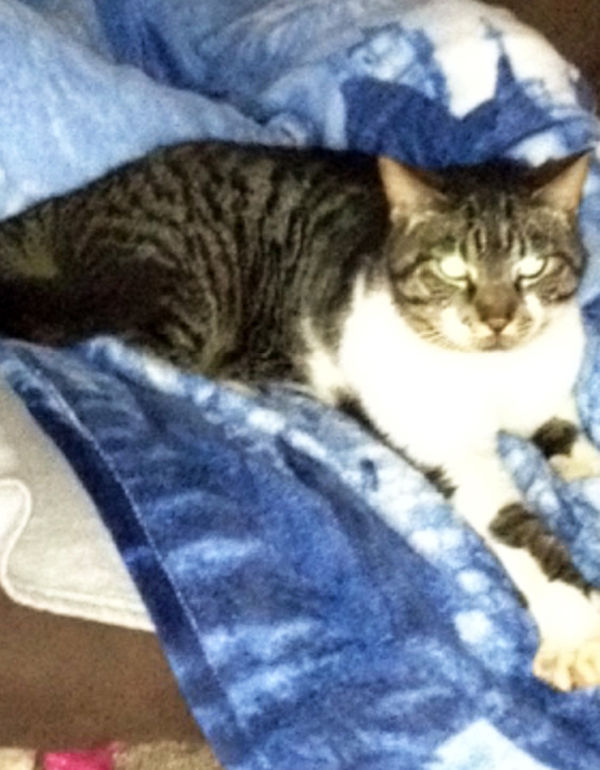WAILUA HOMESTEADS — Just three weeks after a stray hunting dog became ill and died in the Wailua Rise Estates, prompting neighbors to believe the animal was poisoned, residents suspect two cats have been killed intentionally.
In the past, when pet cats disappeared or died suddenly, residents were saddened but not suspicious. That all changed when Tom French reported in January that a stray dog hanging around the neighborhood for more than a year had probably been poisoned.
The dog was found convulsing near French’s yard and was motionless when it was taken to the Kauai Humane Society, where it died.
Another neighbor, Jeff Mira, found his 8-year-old cat named Tako sick in his yard on Feb. 13. The big, docile cat with black and white fur died at the Kapaa Animal Clinic the next day.
The veterinarian who ran tests said the cause of death was antifreeze, Mira said. After hearing about the dog poisoning, he began to check around.
“I began talking to the other neighbors and found out there are other cats missing in and around the neighborhood,” Mira said. “This is too coincidental.”
Mira reported the death to the police. “It just seems strange, this all happening at the same time,” he said.
County spokesperson Sarah Blane said that officers of the Kauai Police Department responded to a cruelty to animal complaint on Aina Lani Place last Sunday.
“Upon further investigation, it appears additional residents believe their animals may have also been poisoned,” Blane said. “The incident remains under police investigation.”
The family was very attached to Tako, who was adopted as a kitten from the humane society in 2009, along with its partner, Poke.
Mira keeps Poke inside the house now. He is afraid the other cat could meet the same fate as Tako.
Two of Mira’s previous cats also died unexpectedly. Max was in poor health and vomiting when he was taken to the veterinarian’s office in 2007. He recovered, but died soon after at home from kidney failure caused by possible poisoning. Margarita disappeared soon after Max died in 2007.
All the cats were outside pets, Mira said. They came home each morning and evening for a meal, and didn’t spend their time searching for food.
Mira said he has an idea who might have done this, but has no proof. He wants to get the word out to others who may have missing pets, so residents can guard against it happening again.
Mira’s next-door neighbor, Jonathon Montabo, thought it odd when Meewe, his 10-year-old gray and white cat went missing. He found it a week later under a cottage on his property.
It was a house cat that gradually began spending its days outdoors. It was at the house every morning and evening, Montabo said, and it died in a place it didn’t normally go.
The hardest part was trying to explain the cat’s death to his wife and three children, ages 15, 6 and 1 1/2.
“Meewe was a crib buddy and a family member,” he said. “It was kind of a blow to them.”
The very next day, Mira stopped by to tell Montabo that his own cat had died, and that he had reported it to the police.
It was a bigger blow to Montabo to realize the neighborhood cats could have been poisoned.
“Words don’t express the feeling I got when I realized someone was intentionally doing this,” he said.
Montabo, who has lived in the neighborhood for six years, said it would be more appropriate for anyone who had a problem with cats in their yard to contact the owner, not to kill the animals. They could call the humane society or the police and get the owner fined if they felt they weren’t doing enough to contain the animal, he said.
“My wife took it really hard,” he said. “My oldest was just 4 when we got him, and how do you explain this to a 6-year-old?”
Montabo has learned that antifreeze is unlikely to be an accidental poison. Residents believe someone put it in dog or cat food.
“We think it could be a neighbor,” Montabo said. “Within a four-house stretch from where that dog was found, there have been two more cats poisoned on same street.”
The neighbors plan to talk to others to see if other cats died outside of the area where the two cats and the dog have died. They are knocking on doors and starting a social media outreach.
Kauai Humane Society Executive Director Penny Cistaro said that with one confirmed antifreeze death, it is impossible to tell if it is intentional or accidental until the source of the poisoning is discovered. They are talking to a third person who lost an animal recently, and are working with police on the investigation.
The older antifreeze formulas are sweet tasting and attracted many animals, she said. Many pets died until the manufacturers began changing the formulas.
“The thing with antifreeze is it doesn’t need to be intentional,” she said.
Vehicles leaking antifreeze are as deadly to pets as someone leaving it out in bowls to kill unwanted animals. Older vehicles that haven’t flushed the cooling systems are especially dangerous, she said.
The humane society wasn’t ruling out intentional poisoning but a leaky vehicle is just as possible, Cistaro said.
“I like to think the best of people,” Cistaro said. “It is so hard to say.”



